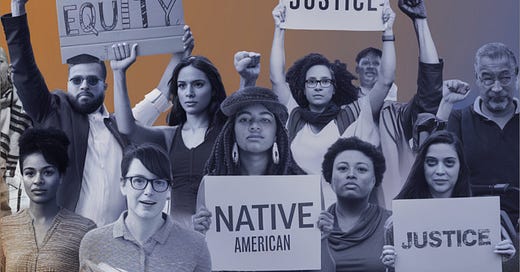🗝️ The Second Trump Era: A Backward March with Bullets and Banned Words
America's justice system is regressing with archaic execution methods and linguistic erasure, reflecting a chilling return to past policies.
😽 Keepin’ It Simple Summary for Younger Readers
👧🏾✊🏾👦🏾
Imagine living in a place where people can be punished in really old and scary ways, like being hurt by a group with guns 🔫, even though we stopped doing that a long time ago. And what if some words 💬 that help us talk about important things like fairness ⚖️ and helping others 🤝 were not allowed to be used anymore? This story talks about how some people in charge are making these old ideas come back ⏪ and what everyone needs to do to help stop this and make sure everyone can talk about and fix problems 🔄.
🗝️ Takeaways
🏹 Execution by Firing Squad: South Carolina executed Brad Sigmon, marking the first firing squad execution in the state.
📚 Linguistic Erasure: The administration has banned words such as "women," "Native American," and "equity" in government communications.
🕊️ Symbol of Regression: Both acts symbolize a broader rollback in civil rights and progress.
✊🏽 Call to Action: Encourages the use of community resistance and engagement to combat regressive policies and language erasure.
Bullets and Banned Words: America's Backwards March in the Second Trump Era
Ya lo hicieron. Lo que temíamos ha sucedido.
Last Friday, as I was publishing my piece about the impending execution of Brad Sigmon by firing squad, the clock was already ticking toward what would become a grim milestone in American criminal justice. Later that evening, at the Broad River Correctional Institution in South Carolina, three anonymous volunteers raised their rifles, took aim at a target placed over 67-year-old Brad Sigmon's heart, and fired simultaneously.
Just like that, South Carolina carried out the first execution by firing squad in 15 years in the United States, and the first ever in the state's history.
A Campaign Promise Fulfilled: Taking America "Back"
During his campaign, Trump repeatedly promised to take America "back." Now we're seeing exactly what that means—back to execution methods from the 19th century, back to erasing the language of inclusion, back to a time when certain groups of people were rendered invisible in our national conversation.
Esto no es progreso. Esto es regresión.
When Sigmon's execution was carried out on March 7, it wasn't just about one man's life being ended for his crimes. It represented something much larger: a tangible symbol of America's regression in how we approach justice, human rights, and dignity. The bullets that tore through Sigmon's chest are emblematic of the brutal force with which this administration is determined to turn back the clock on decades of progress.
The Execution: Clinical, Quick, and Chilling
According to witnesses, the execution was a somber and relatively quick process. Sigmon was strapped into a chair, hooded, and a target was placed over his heart. The three volunteer executioners fired simultaneously using ammunition specially designed to cause immediate death by destroying the heart.
In his final statement, Sigmon expressed remorse and made a pointed appeal to Christians to advocate for ending the death penalty—a powerful last message that challenges the contradiction between professed Christian values and support for state-sanctioned killing.
Witnesses described that Sigmon was pronounced dead within minutes of the shots being fired. The clinical efficiency of the process makes it no less barbaric. If anything, the routine, bureaucratic nature of taking a human life this way only underscores how normalized state violence has become.
Beyond Bullets: Erasing People Through Language
But the regression doesn't stop at returning to archaic execution methods. In a disturbing parallel development, The New York Times has reported that the Trump administration has begun restricting the use of certain terms in government communications. Among the banned or flagged words: "women," "Native American," "race," "equity," and "transgender."
Primero nos disparan. Luego nos borran. First they shoot us. Then they erase us.
This linguistic erasure is no small matter. When government agencies are forbidden from using words like "Native American" or "women," they are effectively being instructed to make invisible the very real disparities, challenges, and needs of these communities. You cannot address problems you cannot name.
The Centers for Disease Control and Prevention (CDC) and other agencies have been directed to avoid terms like "health equity," "disparity," and "culturally appropriate." These are not just words—they represent frameworks for understanding and addressing the very real health gaps that exist between different communities in our country.
The Connection Between Physical and Linguistic Violence
There is a direct line connecting the physical violence of a firing squad execution and the linguistic violence of banning words that acknowledge the existence and struggles of marginalized groups. Both are exercises of state power designed to control, subjugate, and erase.
When we can no longer talk about "race" or "equity," how do we address racial disparities in the criminal justice system? When "transgender" becomes unspeakable, how do we protect transgender people from violence and discrimination? When "women" is a banned term, how do we craft policies that address women's specific health needs or economic challenges?
Es un ataque coordinado contra nuestra humanidad. It's a coordinated attack on our humanity.
A Two-Pronged Assault on Progress
What we're witnessing is a two-pronged assault on the progress our country has made over decades:
The physical rollback of civil rights protections, reproductive rights, LGBTQ+ rights, and humane approaches to criminal justice.
The linguistic erasure of the very terms we need to discuss these issues, advocate for change, and hold power accountable.
This combination is particularly insidious because it makes resistance more difficult. How do you organize against oppression when the language to describe that oppression is being systematically removed from public discourse?
The Broader Pattern of Regression
The firing squad execution and language bans are not isolated incidents. They are part of a broader pattern that includes:
Attempts to repeal civil rights acts that have protected vulnerable communities for generations
Rollbacks of protections for LGBTQ+ individuals, particularly transgender people
Attacks on reproductive freedom and bodily autonomy
Dismantling of environmental protections
Undermining of scientific research, especially on climate change and public health
Attacks on free press and academic freedom
Each of these represents a step backward, away from the more just, equitable, and humane society that many of us have been working toward.
Where Do We Go From Here?
In the face of this coordinated assault on progress, it's easy to feel hopeless. But hopelessness is exactly what those in power want us to feel. When we give in to despair, we stop fighting. And when we stop fighting, they win.
No podemos permitirlo. We cannot allow it.
Instead, we must:
1. Reclaim Language and Insist on Truth
Even as official channels attempt to erase certain words and concepts, we must continue to use them, loudly and proudly. We must talk about race, gender, equity, and justice. We must name the oppression we see and experience.
2. Build Coalition and Community
Now more than ever, marginalized communities need to stand together. Indigenous, Black, Latinx, LGBTQ+, women, disabled individuals—we are stronger together than we are apart. The attempt to divide us through targeted attacks is deliberate. Our solidarity is our strength.
3. Document and Bear Witness
As journalists, activists, and community members, we must continue to document what is happening, even when—especially when—official channels try to obscure it. Brad Sigmon's execution happened. The banning of words like "Native American" and "women" is happening. We must not allow these things to be forgotten or normalized.
4. Engage Locally
While national politics may feel overwhelming, local politics remains a powerful arena for resistance and change. Attend city council meetings, support progressive local candidates, and join community organizations working on issues you care about. Change often begins at home.
5. Prepare for 2026 and Beyond
The midterm elections in 2026 will be a crucial opportunity to begin pushing back against these regressive policies. Start organizing now. Register voters, educate your communities, and support candidates who stand for progress and justice.
A Final Reflection
The image of a firing squad in 2025 America should shock us. The fact that government agencies are being forbidden from using words like "women" and "Native American" should outrage us. If these things don't move us to action, we have already lost something precious—our capacity for moral indignation in the face of injustice.
But I believe we still have that capacity. I see it in the young people protesting on college campuses, in the community organizers working tirelessly in neighborhoods across the country, in the journalists risking their careers to tell difficult truths, and in ordinary people who refuse to be silent in the face of regression.
La resistencia vive en cada uno de nosotros. The resistance lives in each of us.
As Sigmon himself urged in his final statement, those who claim to stand for the sanctity of life must be consistent in that belief—opposing not just abortion but also the death penalty and war. Those who claim to stand for freedom must defend the freedom of all people, not just those who look or love or pray like them.
In these dark times, I am reminded of the words of the Zapatistas: "Preguntando caminamos." We walk by asking questions. So let me ask you:
What small act of resistance can you commit today? And how can we transform our individual acts of resistance into a collective movement strong enough to turn the tide?
Leave your thoughts in the comments below. Your voice matters now more than ever.
No nos rendiremos. Nunca. We will not surrender. Never.






